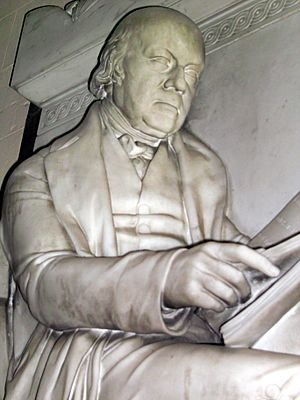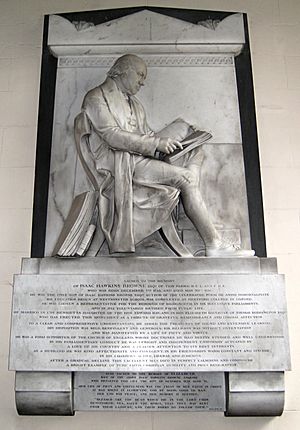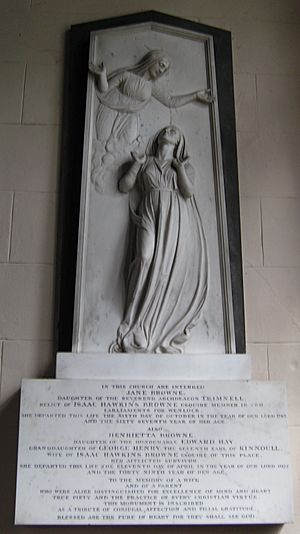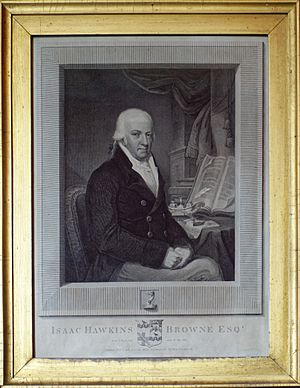Isaac Hawkins Browne (coal owner) facts for kids

Isaac Hawkins Browne (born December 7, 1745 – died May 30, 1818) was an important British politician and businessman. He was a member of the Tory party, which was one of the main political groups at the time. He also owned a large estate and was known for his writings. He was a Fellow of the Royal Society, a group that promotes science.
Contents
Early Life and School
Isaac Hawkins Browne was the only son of a poet, also named Isaac Hawkins Browne. His mother was Jane Trimnell. He went to school at Westminster School and then studied at Hertford College, Oxford University. In July 1770, he became a member of the Royal Society, showing his interest in learning and science.
Landowner and Community Leader
In 1774, Browne bought a large estate called Badger in Shropshire. At first, the house on the estate was rented to a man who worked with iron. Browne also owned land in a place called Malinslee, which is now part of Telford.
In 1790, he started opening coal mines on his land. He also rented out enough land for another businessman, Thomas Botfield, to build an ironworks. Browne was involved with many business people during the time of the Industrial Revolution, which was when many new factories and industries were starting in Britain. He wanted to be part of the political world, which was mostly run by wealthy landowners. Owning Badger helped him create the country lifestyle he wanted.
After traveling through Europe in 1775–1776, he settled at Badger. Between 1779 and 1783, he made Badger Hall much bigger. He also hired artists to paint pictures for his home. He even had the landscape around his home, called Badger Dingle, redesigned to look very beautiful and natural.
Browne cared about his community. In 1784, he helped manage the Salop Infirmary, a hospital in Shrewsbury. From 1799, he supported a Sunday School in Malinslee. He also arranged for a new church, St. Leonard, to be built there in 1805. He likely started and paid for one of the village schools in Badger. After he died, his wife continued to fund it. He also made sure villagers received coal allowances, which helped them stay warm.
Browne took a great interest in the local church in Badger. He had the right to suggest who should be the new priest. He wanted a good leader for the church. After some changes, he found a very dedicated priest named William Smith, who focused only on the parish. Browne was so pleased that he gave Smith the valuable right to choose his own successor.
Political Life
From 1783 to 1784, Browne was the High Sheriff of Shropshire, a high-ranking official in the county.
In 1784, Browne became a Member of Parliament (MP) for Bridgnorth. He served in Parliament for many years, until 1812. He supported the Tory government leaders like William Pitt the younger. In 1803, he was named a commissioner for roads and bridges in the Scottish Highlands.
Records show that Browne spoke in Parliament a few times between 1805 and 1809. He wasn't known as a powerful speaker. Once, when he gave a longer speech, people in Parliament coughed loudly, suggesting they weren't very interested.
In 1805, Browne supported a rule to make sure that priests who were absent from their churches had to pay for someone to cover for them. This was an issue he knew about from his own experience with a previous priest.
Browne was generally a supporter of the way things were. In 1807, he spoke in favor of delaying the Slave Trade Act 1807, which aimed to stop the slave trade. Even though he said he was against the trade, he had family connections to people involved in the West Indies, where slavery was common. The Act was eventually passed, making the slave trade illegal in the British Empire.
He also had strong views against allowing Catholics to have more political power. In 1807, when a bill was proposed to let Catholics serve in the armed forces, Browne argued against it. He believed that allowing Catholics more power would be bad for the country's freedom. He felt that the laws made by earlier generations to limit Catholics were wise and should be kept.
In 1809, Browne spoke against a bill that tried to stop the selling of seats in Parliament. He believed that this practice, though it might seem wrong, actually helped bring wise and talented people into Parliament. He thought the bill would remove many good people from the House of Commons.
His Writings
Browne put together a collection of his father's poems, which was published in 1768.
He also wrote many essays. Some of these were collected in a book called Essays, Religious and Moral, first published in 1815. Another collection, Essays on Subjects of Important Inquiry in Metaphysics, Morals and Religion, was published after he died in 1822.
Family and Passing
Browne's first wife was Henrietta Hay, whom he married in 1788. After she passed away in 1802, he married Elizabeth Boddington. Elizabeth lived 21 years longer than him. He left her the right to use his Badger estate during her lifetime. After she died, the estate was to go to his nephew.
Isaac Hawkins Browne "voluntarily retired from public life" in 1812. He died in London on May 30, 1818, at the age of 72, after a gradual decline in his health.
Images for kids
-
Isaac Hawkins Browne: detail of his memorial in the parish church, Badger, Shropshire.
-
Memorial to Isaac Hawkins Browne and his second wife, Elizabeth, by Francis Leggatt Chantrey, in St. Giles' church, Badger.
-
Memorial to Browne's mother and first wife in Badger parish church, by John Flaxman.
 | Bayard Rustin |
 | Jeannette Carter |
 | Jeremiah A. Brown |








